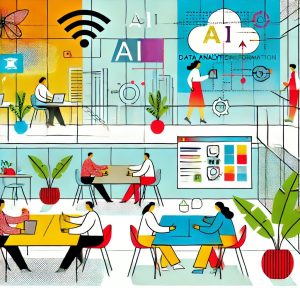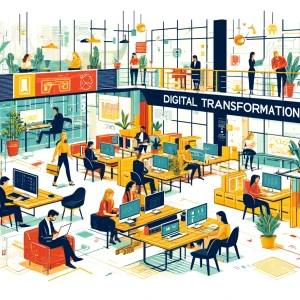Digital transformation encompasses the integration of digital technologies into all aspects of a business, fundamentally altering how it operates, delivers value to customers, and interacts with its workforce. Digital transformation initiatives are no longer a “maybe” but a “must-have” for businesses of all sizes. However, it isn’t a magic bullet. While it unlocks a treasure trove of potential benefits, navigating this journey comes with its own set of hurdles.
Digital transformation initiatives: reshaping the business landscape
Digital transformation initiatives take many forms, ranging from adopting cloud-based infrastructure to implementing data analytics tools to automating workflows. These initiatives aim to improve efficiency, enhance customer experiences, and gain a competitive edge. Some key areas where digital transformation is making a significant impact include:
- Customer experience (CX): digital technologies are enabling companies to create personalized and seamless customer experiences across all touchpoints. This includes leveraging social media to engage with customers, utilizing chatbots for customer support, and implementing data-driven marketing strategies.
- Operational efficiency: digital transformation is streamlining operations, reducing costs, and improving productivity. This is achieved through automation, process optimization, and the adoption of cloud-based technologies.
- Product innovation: digital technologies are fuelling innovation, enabling companies to develop new products and services that meet evolving customer needs. This includes leveraging advanced analytics to identify market trends and using design thinking to create user-centric solutions.
- Employee engagement and empowerment: digital transformation isn’t just about technology; it’s about people as well. The right tools can empower employees to work more efficiently, collaborate seamlessly with colleagues, and access the information they need to perform their jobs effectively. This can lead to increased employee engagement, improved morale, and a more productive work environment.
- Data-driven decision making: digital transformation initiatives generate vast amounts of data. By leveraging data analytics tools and fostering a data-driven culture, organizations can gain valuable insights into customer behaviour, operational performance, and market trends. This data can inform strategic decision-making across all levels of the organization, leading to more informed choices and improved business outcomes.
- Business model transformation: in some cases, digital transformation can lead to a complete overhaul of a company’s business model. This could involve transitioning from a product-centric approach to a service-centric model, leveraging the power of the “sharing economy,” or creating entirely new revenue streams through digital products or services.
Exploring new technologies for unwavering competitive edge
The ever-expanding realm of technology presents countless opportunities for organizations to enhance their operations, innovate, and gain a competitive advantage. Some key emerging technologies that are shaping the future of business include:
- Artificial Intelligence (AI): AI is transforming various industries, from healthcare to manufacturing, by automating tasks, making predictions, and providing personalized insights.
- Machine Learning (ML): ML algorithms are enabling companies to analyse vast amounts of data and uncover hidden patterns and trends, leading to better decision-making and improved outcomes.
- Blockchain technology: blockchain is revolutionizing the way data is stored and exchanged, offering enhanced security, transparency, and traceability.
- Internet of Things (IoT): the IoT is connecting devices and machines to the internet, enabling real-time data collection and analysis for improved efficiency and predictive maintenance.
Empowering HR with technology: a catalyst for success
HR plays a crucial role in driving digital transformation and innovation within organizations. HR technology platforms are becoming increasingly sophisticated, providing tools for talent acquisition, performance management, learning and development, and employee engagement. These tools enable HR teams to operate more efficiently, make data-driven decisions, and support a more engaged and productive workforce.
Some examples of HR technology solutions that are transforming the way HR operates include:
- Applicant Tracking Systems (ATS): ATS software automates the recruitment process, streamlining the screening, matching, and communication with potential candidates.
- Performance Management Systems (PMS): PMS platforms enable objective performance evaluation, feedback, and goal setting, leading to improved employee performance and engagement.
- Learning Management Systems (LMS): LMS platforms provide a centralized platform for delivering training and development resources, enabling continuous learning and skill development.
- Employee engagement platforms: these platforms foster a culture of engagement by providing tools for communication, recognition, feedback, and collaboration.
- Language audits: these platforms helps you verify language skills fully remotely, not only of candidates to make better hire decisions, but also of employees e.g., before and after language training.
Challenges and risks of digital transformation
Digital transformation isn’t a walk in the park. While the potential rewards are vast, there are hurdles to overcome. The initial investment in new technologies can be significant, requiring careful budgeting and prioritization. Automation, while boosting efficiency, can also lead to job displacement, making workforce retraining and upskilling crucial. Cybersecurity threats and data privacy concerns are ever-present, demanding robust security measures and a commitment to responsible data management.
Perhaps the most significant challenge lies not in the technology itself, but in people. Successfully navigating digital transformation requires a cultural shift within organizations. Leaders need to champion a culture of innovation and change management, fostering an environment where employees feel comfortable embracing new ways of working. Building employee buy-in is essential – ensuring everyone understands the purpose behind the transformation and feels equipped to contribute. By acknowledging these challenges and proactively addressing them, organizations can position themselves to reap the full benefits of digital transformation.
Roadmap for implementing digital transformation
Implementing digital transformation effectively requires a structured approach. Organizations can begin by conducting a digital maturity assessment to identify strengths and weaknesses. Next, it’s crucial to develop a clear strategy and roadmap that outlines key objectives and implementation steps. Selecting the right technology solutions that align with business goals is essential, followed by robust change management practices to ensure employee adoption and success.
The future of work and digital transformation
Digital transformation isn’t just about implementing fancy new technologies; it’s about fundamentally reshaping the way we work. As automation and artificial intelligence continue their relentless march forward, the skillsets needed to succeed in the workplace are undergoing a dramatic shift.
The days where rote memorization and repetitive tasks guarantee job security are gone. The future belongs to those who can adapt, learn continuously, and thrive in a dynamic environment. Organizations that recognize this will prioritize investing in continuous learning and development programs for their employees. These programs should equip workers with the digital literacy, critical thinking, problem-solving, and collaboration skills that are increasingly in demand.
The rise of automation isn’t necessarily a harbinger of mass unemployment. However, it does necessitate a focus on workforce reskilling and adaptation. Employees whose current roles become heavily automated will need opportunities to develop new skillsets that complement automation or allow them to transition to new roles altogether. Forward-thinking organizations will embrace this reskilling imperative, viewing it as an investment in their future success.
The digital revolution also opens doors to new possibilities for work arrangements. Flexible work schedules and remote work opportunities are becoming increasingly common, thanks to advancements in collaboration tools and cloud-based technologies. This shift offers a more balanced and adaptable work environment, potentially boosting employee morale, productivity, and overall well-being. It also allows organizations to tap into a wider talent pool geographically, fostering diversity and innovation within the workforce.
However, navigating this future of work effectively requires careful consideration. While digital transformation offers a multitude of benefits, it also presents challenges. Organizations will need to address potential concerns around job security, ensure equitable access to training opportunities, and foster a culture of lifelong learning to maximize the potential of a digitally transformed workforce.
The future of work is a landscape constantly being reshaped by the ever-evolving tide of digital transformation. By embracing continuous learning, fostering workforce agility, and prioritizing a human-centric approach to technology, organizations can position themselves to thrive in this dynamic new era.
Harness the power of language skills in the digital age
Strong communication skills are essential in the digital workplace. Focus Audit Tool offers a comprehensive suite of online language tests to assess and develop the language skills of your workforce. Ensure your teams are equipped for success by fostering a culture of open communication and by identifying and addressing any skill gaps.





